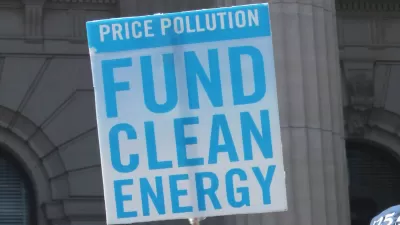On Earth Day, NPR looked at the intersection of the Paris Climate Agreement, which Secretary of State John Kerry signed at the U.N. on Friday, and President Obama's Clean Power Plan which has been given a pause by the Supreme Court.
Key to the United States' compliance with the historic the Paris agreement (COP21) is the President Obama's signature environmental initiative, the Clean Power Plan, that would reduce carbon emissions from existing power plants. Unfortunately, but not unexpectedly, "29 states and state agencies" (PDF file) sued, arguing that the plan was an "overreach of the president's use of executive authority."
Christopher Joyce, NPR science correspondent, reaffirms the importance of the Paris agreement as the "biggest deal" when it comes to fighting climate change but then explains how the above Supreme Court ruling is interfering with the United States' ability to meet its commitment by looking at how three states, Colorado, Georgia, and Pennsylvania, are dealing with meeting the plan. In addition, POLITICO looks at West Virginia's plans.
Colorado, a purple state but major energy producer [Republican Senate, Democratic governor and House]
Grace Hood from Colorado Public Radio explains the clashing between Democratic Governor John Hickenlooper and the Republican-controlled Senate and Democrat-controlled House.
Last year, Republican Attorney General Cynthia Coffman joined about two dozen other states and legally challenged the rule. Democratic Governor John Hickenlooper vowed to move forward [but backed down], even after the Supreme Court but the rule on hold. But state Republicans struck back, first with an effort to completely defund the 95-person agency tasked with implementing the plan....
Georgia, a red state
"The day the Supreme Court stay was issued, Georgia just stopped working on the Clean Power Plan," states Molly Samuel from WABE in Atlanta. "There was no public debate between state officials about that."
Georgia had been taking a sort of two-pronged approach since the EPA released the plan. The attorney general was suing to stop it. At the same time, the state Environmental Protection Division...was preparing to implement it - until the stay.
However, Georgia Power, the state's largest utility which had planned to continue to reduce its coal use, reversed course after the stay was issued. "Georgia Power is still banking on coal, as if there is no Clean Power Plan," states Samuel.
Pennsylvania, purple state [Democratic governor, Republican legislature] but foremost a coal state
Thanks to fracking for natural gas, Pennsylvania is committed to converting to a cleaner grid, not just with natural gas but with renewables as well, though Republicans have tried unsuccessfully to delay the state's plan to comply with the new rule.
"John Quigley heads the [state Department of Environment Protection] and says whether or not the Clean Power Plan survives the legal challenge, the grid is already changing," states Marie Cusick with StateImpact Pennsylvania.
What is absolutely inevitable is that we need to have lower carbon energy generation. We're facing a future of cheap, shale gas and continually declining costs of renewable energy.
West Virginia, purple, but a coal state
Like Georgia, the Supreme Court stay has shown its ill effect here.
"The West Virginia Department of Environmental Protection thinks that carbon trading would allow the state to comply with the Clean Power Plan in an economically feasible way," writes Eric Wolff for POLITICO Morning Energy.
Too bad state law forbids such a program. The DEP report says that if the law remains in place, and the Clean Power Plan is eventually upheld, the state might have to close coal plants in the state, putting its grid reliability at risk. DEP argues that legislature should repeal the law if the rule survives court review.
West Virginia and Texas were the lead plaintiffs in State of West Virginia, et al. v. EPA, U.S. Supreme Court, No. 15A773.
The outcome of the Supreme Court's stay was likely affected by the sudden death of Supreme Court Justice Antonin Scalia on Feb. 13. Planetizen looked at the implications on both the Clean Power Plan and the Paris climate agreement here.
USA TODAY reports on the signing of COP21 by representatives from 175 nations at the U.N. on Friday.
"We are in a race against time." U.N. secretary-General Ban Ki-moon told the gathering at the United Nations headquarters in New York. "The era of consumption without consequences is over."
FULL STORY: On Earth Day, Nations To Sign Off On Historic Climate Pact

Maui's Vacation Rental Debate Turns Ugly
Verbal attacks, misinformation campaigns and fistfights plague a high-stakes debate to convert thousands of vacation rentals into long-term housing.

Planetizen Federal Action Tracker
A weekly monitor of how Trump’s orders and actions are impacting planners and planning in America.

In Urban Planning, AI Prompting Could be the New Design Thinking
Creativity has long been key to great urban design. What if we see AI as our new creative partner?

Pedestrian Deaths Drop, Remain Twice as High as in 2009
Fatalities declined by 4 percent in 2024, but the U.S. is still nowhere close to ‘Vision Zero.’

King County Supportive Housing Program Offers Hope for Unhoused Residents
The county is taking a ‘Housing First’ approach that prioritizes getting people into housing, then offering wraparound supportive services.

Researchers Use AI to Get Clearer Picture of US Housing
Analysts are using artificial intelligence to supercharge their research by allowing them to comb through data faster. Though these AI tools can be error prone, they save time and housing researchers are optimistic about the future.
Urban Design for Planners 1: Software Tools
This six-course series explores essential urban design concepts using open source software and equips planners with the tools they need to participate fully in the urban design process.
Planning for Universal Design
Learn the tools for implementing Universal Design in planning regulations.
planning NEXT
Appalachian Highlands Housing Partners
Mpact (founded as Rail~Volution)
City of Camden Redevelopment Agency
City of Astoria
City of Portland
City of Laramie



























